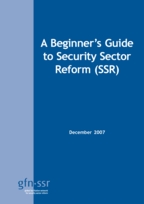Crime and policing
A fundamental development aim must be to protect poor people from violence and intimidation, and to secure their personal property. This requires effective state and non-state policing, as well as crime prevention and victim support initiatives. Current research emphasises citizen-centred approaches and service delivery in contrast to traditional ‘law enforcement’ approaches. Cooperation between state police services, civil society and non-state systems should be pursued where appropriate.
Page contents
- Where is a good place to start?
- Crime prevention
- Victim support
- Community policing
- Police reform
- Police reform in conflict affected areas
- Non-state security systems
- Additional information resources
Where is a good place to start?
Clegg, I., Hunt, R. and Whetton, J. 2000, ‘Policy Guidance on Support to Policing in Developing Countries’, Centre for Development Studies, Swansea, report prepared for the Department for International Development
This report from the Centre for Development Studies (CDS) aims to provide policy and technical guidance on assistance to building effective and democratic police services in developing countries. Since work on policing is rarely available in these countries, the report heavily draws on developed countries’ experiences, particularly the UK, the US and Northern Ireland, to provide valuable lessons for policing in developing countries.
Access full text: available online
Crime prevention
Approaches to crime prevention are often based on understanding the causes of crime, sometimes through statistical analysis, in order to design strategies for reducing ‘risk factors’. One set of strategies attempts to tackle the social causes of crime, through cooperation with other governmental agencies in areas such as employment generation, poverty reduction, housing and education. Other approaches include adapting police methods, the rehabilitation of offenders and community projects to reduce the opportunities for crime in the locality.
Akpokodje, J., Bowles, R. and Tigere, E., 2002, ‘Evidence-based Approaches to Crime Prevention in Developing Countries – A Scoping Review of the Literature’, Department for International Development (DFID), London
What are the best approaches for crime prevention in developing countries? What is the quality and extent of research on the subject? This report from the Centre for Criminal Justice Economics and Psychology at the University of York comprises a literature review of the crime prevention programmes and approaches in developing countries. A total of 91 studies published between 1980 and 2002 were included. Sherman’s crime prevention definition, which states that crime prevention is a result of everyday practices concentrated in different institutional settings, was used.
Access full text: available online
Frank, C., 2003, ‘What Have We Learned? Social Crime Prevention in South Africa: A Critical Overview’, South African Crime Quarterly, No. 6
Crime prevention is a new endeavour for South Africa and its progress has been mixed. One area of weakness is the generation and utilisation of information, which is crucial to its success. This Open Society Foundation article offers a review of developments in the policy and practice of crime prevention in South Africa and briefly discusses initiatives intended to prevent or reduce crime.
Access full text: available online
Pelser, E., 2002, ‘Crime Prevention Partnerships: Lessons from Practice’, Institute of Security Studies, South Africa
Predicting criminal activity is difficult, and dependent on contested theories. However, a collaborative, multi-disciplinary, multi-agency approach has been shown to work best. This Institute of Security Studies book looks at some approaches taken towards the implementation of crime prevention in South Africa, and draws lessons from them. It was written for practitioners, particularly those in government and non-governmental organisations
Access full text: available online
Focusing on crime prevention can be cost-effective in comparison to traditional law-enforcement methods.
US Department of Justice, 2000, ‘Investing Wisely in Crime Prevention: International Experiences’, Bureau of Justice Assistance Monograph, US Department of Justice, Washington
Crime is expensive for ordinary citizens. Prevention projects in the United States have reduced crime rates, however they are still at an unacceptable level and more needs to be done. This Bureau of Justice Assistance publication looks at ways to reduce crime in the United States and examines trends in the United Kingdom, the Netherlands, France and New Zealand.
Access full text: available online
Victim support
Victim support is concerned with making the criminal justice system more responsive to the needs of those affected by crime. It involves training for state employees, and sometimes customary leaders and NGOs, to ensure that victims are treated with respect and sensitivity. One component is support for victims in their engagement with criminal justice institutions. Another aspect is improving services for victims to respond to their immediate needs and to help with long-term recovery. Victim support can be linked to crime prevention, as some approaches seek to prevent repeat victimisation.
United Nations Office for Drug Control and Crime Prevention, 1999, ‘Handbook on Justice for Victims’, UNODC, Centre for International Crime Prevention, New York
Victims of crime have often been forgotten or faced ‘secondary victimisation’ by the criminal justice system. Should victims of crime be involved in decision making relating to their case? Is this empowering, or will it cause the victim stress and lead to unfair sentencing? This United Nations Centre for International Crime Prevention Handbook on Justice for Victims looks at practical measures that address the needs of crime victims.
Access full text: available online
United Nations Office for Drug Control and Crime Prevention, 1999, ‘Guide for Policymakers on the Implementation of the United Nations Declaration of Basic Principles of Justice for Victims of Crime and Abuse of Power’, UNODC, Centre for International Crime Prevention, New York
Victims of crime are often forgotten as more attention is paid to ensuring due process for the defendant. The United Nations (UN) Centre for International Crime Prevention has designed a guide for policymakers who are responsible for providing victims of crime with assistance and access to justice. The guide sets out lines of work that can be pursued by countries implementing the1985 Declaration of Basic Principles of Justice for Victims of Crime and Abuse of Power.
Access full text: available online
The use of restorative justice or other forms of mediation are becoming increasingly popular, with implications for how to ensure a satisfactory standard of victim support. This is a particularly important issue where victims have particular needs, such as those who have experienced domestic violence.
Dissel, A. and Ngubeni, K., 2003, ‘Giving Women their Voice: Domestic Violence and Restorative Justice in South Africa’, Paper presented at the XIth International Symposium on Victimology, Stellenbosch, July 2003
Does mediation in domestic violence cases take women’s’ needs fully into account? Do the women who have taken part in mediation feel that it was successful? How can Victim Offender Counselling and mediation work with traditional authorities? This paper from the Centre for the Study of Violence and Reconciliation looks at the experiences of a Restorative Justice Initiative (RJI) in South Africa using Victim Offender Counselling (VOC) in domestic violence cases.
Access full text: available online
Community policing
There is no universal definition of community policing. Its characteristics vary considerably between countries, and the concept is continually evolving. In general, community policing involves sustained collaboration and consultation between local police and local residents. Proponents argue that it promotes accountability to local citizens, improves service delivery and combines the resources of the police, local government and local residents to ensure more effective crime reduction.
Pelser, E., 2000, ‘An Overview of Community Policing in South Africa’, Annex C in Policy Guidance on Support to Policing in Developing Countries, Clegg, I., Hunt, R. and Whetton J., University of Wales, Swansea
Community policing was launched in South Africa over a decade ago, yet police response to the policy remains largely symbolic. Why has it failed to transform the police service and reduce crime? This annex to a University of Wales publication analyses the shortcomings of community policing in South Africa, and suggests how the initiative should be incorporated into mainstream policing policy.
Access full text: available online
Davis, R.C., Henderson, N.J. and Merrick, C., 2003, ‘Community Policing: Variations on the Western Model in the Developing World’, Police Practice and Research, Vol. 4, No. 3How easily can democratic policing replace authoritarian policing? Is it possible to adapt the concept of community policing to local environments in developing countries? The case studies in this paper from the Vera Institute of Justice suggest that efforts to introduce community policing often run in to serious difficulties. They also suggest that there is no one uniform model for community policing because the local context and history are very influential on success.
Full document: available via document delivery. Please see document summary.
Community policing may not necessarily be more democratic than traditional approaches. The article below argues that it can reproduce the inequalities, coercion and clientelism present in wider society.
Ruteere, M., and Pommerolle, M., 2003, ‘Democratizing Security or Decentralizing Repression? The Ambiguities of Community Policing in Kenya’, African Affairs Volume 102, No. 409, Royal African Society, pp. 587–604 (18)
Community policing strategies have been developed and applied in western countries from the 1980’s, and recently adopted by developing countries. Have they been successful in addressing and solving the causes of increasing crime or have they contributed to the preservation of inequalities? This article from the Royal African Society addresses this issue in relation to Kenya, where two very different community policing projects have been implemented.
Full document: available via document delivery. Please see document summary.
The following article describes international experiences in civilian oversight as a method of monitoring police performance and discusses key challenges.
Phillips, E. and Trone, J., 2002, Building Public Confidence in Police Through Civilian Oversight, Vera Institute of Justice, New York
How can citizens know about and demand respectful and effective policing? How can public confidence in the police be built through civilian oversight? This paper from the Vera Institute of Justice, summarises the views and experiences shared at an international meeting on civilian oversight in Los Angeles in May 2002. The aim of the paper is to connect the conversation in Los Angeles to a wider, ongoing process around the world calling for democratic policing and improvements in how police treat citizens.
Access full text: available online
Police reform
Out of all justice institutions, poor people often have most frequent contact with the police, either as victims of crime or as those accused of a criminal offence. Where there are authoritarian policing models and corruption, this contact can be discriminatory and repressive. As well as promoting professionalism, democratic reform of the police aims to shift the focus of policing from enforcement roles to crime prevention and service delivery. Accountability, human rights and partnerships with other agencies and civil society are emphasised.
Stone, C,. 2005, ‘Supporting Security, Justice and Development’, Lessons for a New Era’, Vera Institute of Justice, New York
An understanding of how insecurity and poverty are linked is increasingly informing development assistance. How can assistance with policing and justice be strengthened? This paper, part of a larger study commissioned by the UK government, draws together lessons from the experiences of recent UK funded policing and justice programs in seven countries: Afghanistan, India, Jamaica, Malawi, Nepal, Nigeria and Sierra Leone.
Access full text: available online
Clegg, I., Hunt, R. and Whetton, J. 2000, ‘Policy Guidance on Support to Policing in Developing Countries’, report prepared for the Department for International Development (DFID), Centre for Development Studies, Swansea
This report from the Centre for Development Studies (CDS) aims to provide policy and technical guidance on assistance to building effective and democratic police services in developing countries. Since work on policing is rarely available in these countries, the report heavily draws on developed countries’ experiences, particularly the UK, the US and Northern Ireland, to provide valuable lessons for policing in developing countries.
Access full text: available online
Biddle, K., Clegg, I. and Whetton. J. 1998, ‘Evaluation of ODA/DFID Support to the Police in Developing Countries: Synthesis Study,’ School of Social Sciences and International Development, University of Wales, Swansea
This is an evaluation of DFID support to the development of efficient, effective, accountable and community-based police forces in the developing world. This report attempts to understand how DFID can achieve ‘safety, security and access to justice for all’ through a more inclusive and pro-active approach to policing.
Access full text: available online
Bayley, D.H., ‘Democratizing the Police Abroad: What to Do and How to Do it’ National Institute of Justice, US Department of Justice, NCJ 188742, June 2001
This study is concerned with the accountability of police to the citizens in their country, and the degree to which the police focus on providing assistance to those citizens. It outlines a series of 87 lessons, based on a synthesis of more than 500 books, articles and documents by observers and practitioners (a bibliography of which accompanies the article). These lessons are divided among four sections: generic police reform; experiences with development assistance to foreign police forces; the role of civilian police in peacekeeping operations; and lessons for American management of police reform abroad.
Access full text document: available online
South Africa’s police reforms in the context of post-apartheid transition and rising crime levels are a particularly popular case study.
Shaw, M., 2002, ‘Conclusion: Options and Prospects’ in Crime and Policing in Post-Apartheid South Africa: Transforming Under Fire, C Hurst and Co., London
The new democracy of South Africa is blighted by high rates of crime, especially violent crime. What effect is crime having on the stability of democracy? What can be done to reverse the worsening crime trend? This chapter presents policy recommendations for structural reform in South African policing, focusing particularly on local accountability and service delivery, centralised intelligence and crime prevention.
Full document: available via document delivery. Please see document summary.
Bruce, D., 2003, Democratic reform of the police – any lessons for Kenya from South Africa? Centre for the Study of Violence and Reconciliation, Johannesburg
How can democratic reforms best be carried out within a police force? What lessons from the experience of police reform in South Africa might be applicable to Kenya? This report by the Centre for the Study of Violence and Reconciliation, argues against an over-ambitious reform agenda and suggests an approach to some of the complexities of the process of police reform.
Access full text: available online
Police reform in conflict-affected areas
The following resources consider the specific opportunities and challenges to police reform in conflict and post-conflict areas. (The GSDRC topic guide on transitional justice may also be of interest in this respect.)
Ziegler, M. and Nield, R. 2001, ‘From Peace to Governance: Police Reform and the International Community’, Washington Office on Latin America (WOLA)
This report summarises the findings of a conference, ‘Police Reform and the International Community: From Peace Processes to Democratic Governance’. Despite the political risks, the positive aspects of police reform have encouraged donors to participate. Police reform can support demilitarisation and democratisation, boost economic growth, reduce poverty, and improve respect for human rights. However, case studies from Central and South America and South Africa highlight the difficulty of achieving reform where violent crime is on the rise.
Access full text: available online
Non-state security systems
Non-state security systems include vigilante and neighbourhood watch organisations set up in local communities. Such organisations can be essential for poor people whose livelihoods are threatened by theft of private property. However, there are human rights risks where such organisations administer punishments without due process. The level of local legitimacy and inclusiveness of non-state security systems is important as they range from community groups to protection rackets and organised crime. In addition, private security companies are increasingly operating in countries where state law enforcement is inadequate, with implications for the security gap between the rich and poor. (The GSDRC topic guide on non-state justice may also be of interest in this area.)
Shaw, M., 2002, ‘Chapter 6: The Impact of Private Policing,’ in Crime and Policing in Post-Apartheid South Africa: Transforming under Fire, C Hurst & Co, London
Despite a peaceful transition to democracy, post apartheid South Africa has experienced a dramatic increase in violent crime. This trend has been met by a rapid increase in private security companies providing services to the suburban middle class. This chapter explores the nature of the private sector boom and its role in achieving justice and security in South Africa.
Full document: available via document delivery. Please see document summary.
Additional information resources
A collection of abstracts from the Second Slovene Criminology Conference, held in Ljubljana in September 2003 illustrates the breadth of disciplinary and policy approaches that are engaged in crime analysis and prevention.
The United Nations Office on Drugs and Crime (UNODC) website has a section on its Crime Programme.
The International Victimology website is hosted by the Research and Documentation Centre (RDC) of the Netherlands Ministry of Justice. It provides an introduction to the subject of victimology, and links to online documents.
The website of the South African Institute of Security Studies offers access to many online publications on policing and the criminal justice system in Southern Africa.









